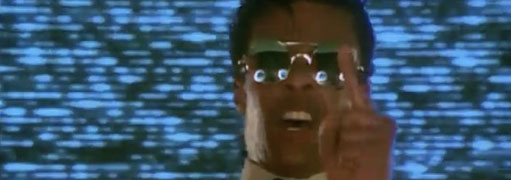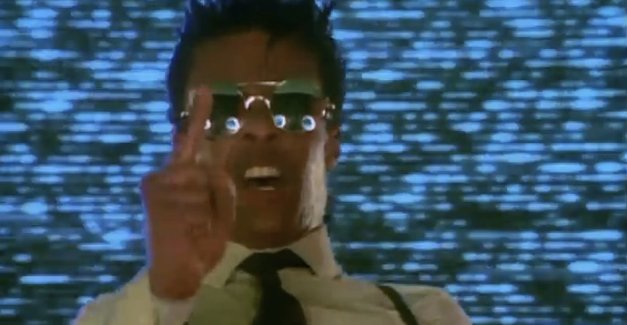After completing his award-winning 2004 documentary Plagues and Pleasure on the Salton Sea , San Francisco-based director Chris Metzler went out on tour, roadshowing the film, meeting audiences and doing Q & As. He passed through Albuquerque, stopping briefly at the Guild Cinema. He’ll be back again this weekend with his new film, Everyday Sunshine: The Story of Fishbone. The film chronicles the tumultuous, multidecade life of funk/punk/ska pioneer Fishbone—starting at the roots of L.A.’s punk rock scene, traveling through the ups and downs of success, and heading straight into the weirder realms of cult brainwashing, attempted kidnapping and theremin worship. The Alibi took the opportunity to chat with Metzler about the madcap, music-based documentary before his arrival in New Mexico. Did you grow up as a fan of Fishbone? The thing that’s a little bit unusual with this film is that most music documentaries are either made by fans of the band or commissioned by the band or record label. This one really came about through chatting up with a filmmaker friend of mine. We were agreeing that most music documentaries just suck—because unless you’re a fan of the band or familiar with the music, there isn’t much there. It’s like insider baseball. He thought Fishbone was the one band that maybe there would be something interesting there. Once we delved into the history, the two things that really attracted me were that: One, there’s these large cultural and social forces that you can explore. Because the band wouldn’t exist without these desegregation efforts in Los Angeles in the late ’70s. And the other thing is, it’s a story of outsiders, these guys that really fit nowhere but fit in everywhere at the same time. They just kind of carved their own path. Those are the sorts of characters, as a filmmaker, that are going to be interesting. Because there are different risks and rewards when you put everything on the line. And as you know from the Salton Sea film, I like my offbeat characters. What was the band’s response to shooting this warts-and-all portrait? When we started pitching the thing to them—we approached them after a concert one rainy San Francisco night—never at all were they concerned about what was gonna be seen. Their only concern was, Hey, documentaries are about people who are dead or aren’t relevant anymore: We’re still out here doing this stuff! And we’re like, That’s the reason why we find your story so interesting. It’s not just a historical portrait but a portrait of friendship and this kind of punk rock endurance. Fishbone has always felt to me like the quintessential L.A. band. But I was never really sure why. This film really brought it home, though. When we started out, we figured that the story of the city of Los Angeles would be integral in the sense that you can never really separate where you’re from. And it happened to be even more true than we ever expected. … We knew we wanted to let the film not only be a story of a band and its history and a story of friendship. But we also wanted a story of the African-American experience in Los Angeles over the last several decades through the eyes of this band that was not only from South Central Los Angeles but also went out and changed the music scene in California. We knew the band obviously influenced a great number of very successful contemporary musicians. I think as we delved into it, that list just continued to grow. How was it decided whom to interview for the film, because it’s an impressive list—everybody from Mike Watt to Perry Farrell to Tim Robbins. It was definitely detective work. Then, once you start reaching out to people, then other suggestions and ideas get out there. Our biggest challenge was having to whittle it down. Because [when] anybody heard there was a Fishbone documentary being made, everybody wanted to be a part of it—from big to small. That’s exciting, the kind of generosity of folks like Gwen Stefani or Flea or Ice-T. … Really, the main decision process was we didn’t want this to be the kind of music documentary where everybody is singing the band’s praises about how they’re really wonderful, and you really should know about them, and if not you’re stupid and you need to discover them. Obviously, there’s always going to be an undercurrent of that when you’re dealing with a cult, underground band like Fishbone. But all the people in the film are not only folks that were influenced musically but also were close personal friends. We wanted people who could talk about Angelo and Norwood and the rest of the guys as human beings. These are friends who have been there with them in the trenches. How did Laurence Fishburne get involved as the film’s narrator? You know, It’s funny: Laurence was on our list of potential interviewees, mainly because we knew he was a friend of the band and had always liked them. His relationship with the band goes back really far. He was a bouncer at punk rock clubs in Hollywood in the early ’80s. This is even after [his acting debut in] Apocalypse Now . One day, he was working the door and he heard this really crazy music coming out and he’s like, What the hell is this? He went in and was taken by the enthusiasm of the live show. The guys became friends, and they’ve maintained the friendship over the years. So, when we knew that we wanted to do some narration, obviously he jumped to the top of that list because he’s got a really great voice. But also as an African-American guy, of the band’s similar age, as a friend of the band, we thought personally he could relate to some things. We approached him, and he was like, But I want to be interviewed, too! Well, we can’t do the interview and the narration. He was very generous and said, Hey, I wanna do this. So you’re out touring with the film, and you’ll be passing through New Mexico? That is absolutely true. I had such a good time last time at the Guild I had to come back. When possible, [co-director Lev Anderson and I] are trying to travel around with the film. I’m the one that’s lucky enough to come to Albuquerque. We have kind of a New Mexico tour. The film will screen at the Guild Friday through Tuesday. It’s opening in Santa Fe that same weekend and then also Taos.
Everyday Sunshine: The Story of Fishbone
Runs Dec. 9 though Dec. 13
Director Chris Metzler will introduce the film on Friday, Dec. 9
Guild Cinema 3405 Central NEguildcinema.com






